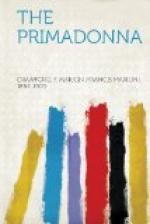She remembered, too, how Lushington and Mrs. Rushmore had warned her and entreated her not to become an opera-singer. She had taken her future into her own hands and had soon found out what it meant to be a celebrity on the stage; and she had seen only too clearly where she was classed by the women who would have been her companions and friends if she had kept out of the profession. She had learned by experience, too, how little real consideration she could expect from men of the world, and how very little she could really exact from such people as Mr. Van Torp; still less could she expect to get it from persons like Schreiermeyer, who looked upon the gifted men and women he engaged to sing as so many head of cattle, to be driven more or less hard according to their value, and to be turned out to starve the moment they were broken-winded. That fate is sure to overtake the best of them sooner or later. The career of a great opera-singer is rarely more than half as long as that of a great tragedian, and even when a primadonna or a tenor makes a fortune, the decline of their glory is far more sudden and sad than that of actors generally is. Lady Macbeth is as great a part as Juliet for an actress of genius, but there are no ‘old parts’ for singers; the soprano dare not turn into a contralto with advancing years, nor does the unapproachable Parsifal of eight-and-twenty turn into an incomparable Amfortas at fifty. For the actor, it often happens that the first sign of age is fatigue; in the singer’s day, the first shadow is an eclipse, the first false note is disaster, the first breakdown is often a heart-rending failure that brings real tears to the eyes of younger comrades. The exquisite voice does not grow weak and pathetic and ethereal by degrees, so that we still love to hear it, even to the end; far more often it is suddenly flat or sharp by a quarter of a tone throughout whole acts, or it breaks on one note in a discordant shriek that is the end. Down goes the curtain then, in the middle of the great opera, and down goes the great singer for ever into tears and silence. Some of us have seen that happen, many have heard of it; few can think without real sympathy of such mortal suffering and distress.
Margaret realised all this, without any illusion, but there was another side to the question. There was success, glorious and far-reaching, and beyond her brightest dreams; there was the certainty that she was amongst the very first, for the deafening ring of universal applause was in her ears; and, above all, there was youth. Sometimes it seemed to her that she had almost too much, and that some dreadful thing must happen to her; yet if there were moments when she faintly regretted the calmer, sweeter life she might have led, she knew that she would have given that life up, over and over again, for the splendid joy of holding thousands spellbound while she sang. She had the real lyric artist’s temperament, for that breathless silence of the many while her




